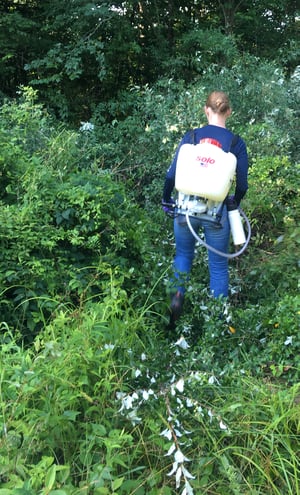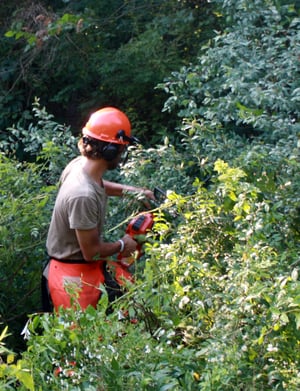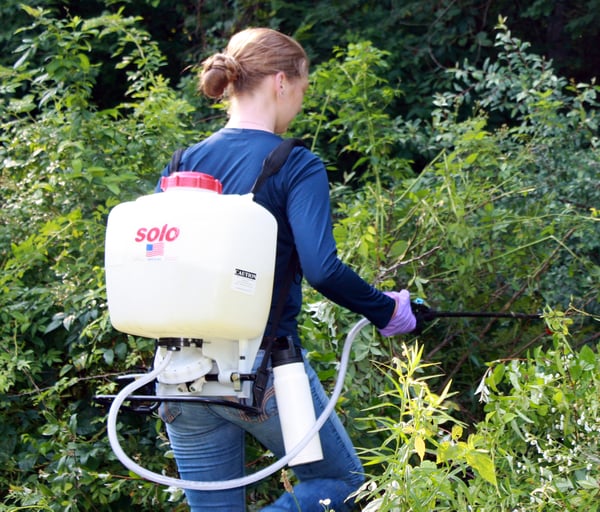NELSONVILLE, Ohio—A group of Hocking College students wound their way through the trails at Wolf Creek Wildlife Area recently.
 Wielding chain saws, backpack sprayers and other tools, the students and their instructor Dale Hatfield were on a mission to seek out and eradicating invasive species on the Ohio Department of Natural Resources property in rural Athens County.
Wielding chain saws, backpack sprayers and other tools, the students and their instructor Dale Hatfield were on a mission to seek out and eradicating invasive species on the Ohio Department of Natural Resources property in rural Athens County.
The trip, which is a regular occurrence for the group, is part of the new Natural Resources Conservation Contractors Certificate that Hocking College's Wildlife Resources and Forest management programs offer.
Hatfield, who's been teaching forestry-related courses at Hocking College for nearly 30 years, said the certificate will allow students to learn skills that will enable them to be contractors with federal, state and local natural resources and conservation agencies.
"There's a deficiency in the number of people to do this work," Hatfield, who's done conservation contracting as a side business from his Hocking College duties for about 20 years, said.
What is Conservation Contracting?
Conservation contractors are private contractors who work with agencies to help upkeep natural public spaces by doing tasks like pollination plantings, timber stand improvement, wildlife and forest habitat quality assessments, prescribed burning, tree planting, and invasive plant control.
 "There's a real demand for people with these skills as well as for new contractors," Ryan Harris, assistant wildlife management supervisor for the Ohio Department of Natural Resources, Division of Wildlife, said.
"There's a real demand for people with these skills as well as for new contractors," Ryan Harris, assistant wildlife management supervisor for the Ohio Department of Natural Resources, Division of Wildlife, said.
Harris was involved in early discussions to help shape the program and gave input on what skills would most benefit students. He also helped establish the current agreement between ODNR and the college to allow the class to work at Wolf Creek.
"There's a whole list of tasks the U.S. Forestry Service and natural resource departments contract out," Hatfield said. "They don't have the workers to do it all. It's faster and more efficient for them to contract it out."
What does the certificate program involve?
The new two-semester certificate includes courses in equipment operation, forest management, wetland and grassland ecology and management, and introduction to entrepreneurship.
 A vital part of the certificate is the field seminar that Hatfield teaches. It gives students practical hands-on training. During the current seminar, students are doing invasive plant control. In future sessions, they'll do forest inventory assessments and timber stand improvement.
A vital part of the certificate is the field seminar that Hatfield teaches. It gives students practical hands-on training. During the current seminar, students are doing invasive plant control. In future sessions, they'll do forest inventory assessments and timber stand improvement.
"The future of wildlife and forest management work will most certainly include the need for private contractors with the skill and know-how to implement conservation practices that will help improve or maintain quality wildlife habitats and forest ecosystems," Lynn Holtzman, Hocking College's Wildlife Resources Management program manager, said.
Hatfield believes the future that Holtzman mentioned can be bright for his students.
"With enough determination and their education at Hocking College, students can set themselves up for success with this certificate," he said. He added that students could work for contractors or set up their own contracting companies.
Harris agrees that the opportunities could be plentiful for certificate holders.
"They could work for existing contractors, public agencies or even themselves to complete habitat management on both public and private lands," he said.
For more information about the Natural Resources Conservation Contractors Certificate, please contact Wildlife Resources Management Program Manager Lynn Holtzman at holtzmanl@hocking.edu or 740-753-6274 or contact Forest and Tree Care Manager Dale Hatfield hatfildd@hocking.edu or 740-753-6286.



